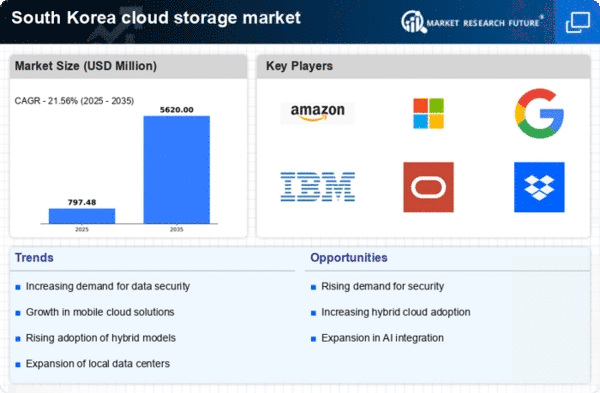Rising Demand for Remote Work Solutions
The cloud storage market in South Korea experiences a notable surge in demand due to the increasing prevalence of remote work solutions. As organizations adapt to flexible work environments, the need for accessible and secure data storage becomes paramount. In 2025, it is estimated that approximately 60% of South Korean companies will implement remote work policies, driving the necessity for cloud storage solutions that facilitate collaboration and data sharing. This trend indicates a shift towards digital transformation, where businesses prioritize cloud-based platforms to enhance productivity and operational efficiency. The cloud storage market is thus positioned to benefit from this evolving work culture, as companies seek reliable and scalable storage options to support their remote workforce.
Growing Data Generation and Storage Needs
The exponential growth of data generation in South Korea significantly impacts the cloud storage market. With the rise of IoT devices, social media, and digital transactions, data creation is projected to increase by over 30% annually. This surge necessitates robust storage solutions capable of handling vast amounts of information. As businesses and individuals seek to store, manage, and analyze this data, the cloud storage market is likely to expand rapidly. In 2025, the total data stored in cloud environments is expected to reach 1.5 zettabytes, highlighting the critical role of cloud storage in accommodating the burgeoning data landscape. Companies are increasingly recognizing the importance of scalable storage solutions to meet their evolving data needs.
Enhanced Focus on Disaster Recovery Solutions
In South Korea, the cloud storage market is witnessing a heightened emphasis on disaster recovery solutions. Organizations are increasingly aware of the risks associated with data loss due to cyberattacks, natural disasters, or system failures. As a result, the demand for reliable backup and recovery options is on the rise. It is estimated that by 2025, around 45% of South Korean enterprises will prioritize cloud-based disaster recovery solutions as part of their data management strategies. This trend underscores the importance of resilience in business operations, prompting investments in cloud storage technologies that ensure data integrity and availability. The cloud storage market is thus positioned to thrive as companies seek to mitigate risks and safeguard their critical information.
Increased Emphasis on Data Privacy Regulations
The cloud storage market in South Korea is significantly shaped by the increasing emphasis on data privacy regulations. With the implementation of stringent laws governing data protection, businesses are compelled to adopt cloud storage solutions that comply with these regulations. In 2025, it is anticipated that over 70% of South Korean companies will prioritize compliance with data privacy standards, influencing their choice of cloud storage providers. This trend indicates a growing awareness of the importance of safeguarding sensitive information, which in turn drives demand for secure and compliant cloud storage options. The cloud storage market is thus likely to expand as organizations seek solutions that not only meet regulatory requirements but also enhance their overall data security posture.
Government Initiatives Supporting Cloud Adoption
The South Korean government plays a pivotal role in promoting the adoption of cloud technologies, thereby influencing the cloud storage market. Various initiatives aimed at enhancing digital infrastructure and encouraging businesses to transition to cloud-based solutions are underway. For instance, the government has allocated approximately $500 million to support cloud innovation and development in 2025. This funding is expected to facilitate the growth of the cloud storage market by providing resources for research, development, and implementation of advanced cloud solutions. As public sector organizations increasingly migrate to the cloud, private enterprises are likely to follow suit, further driving the demand for cloud storage services.
















